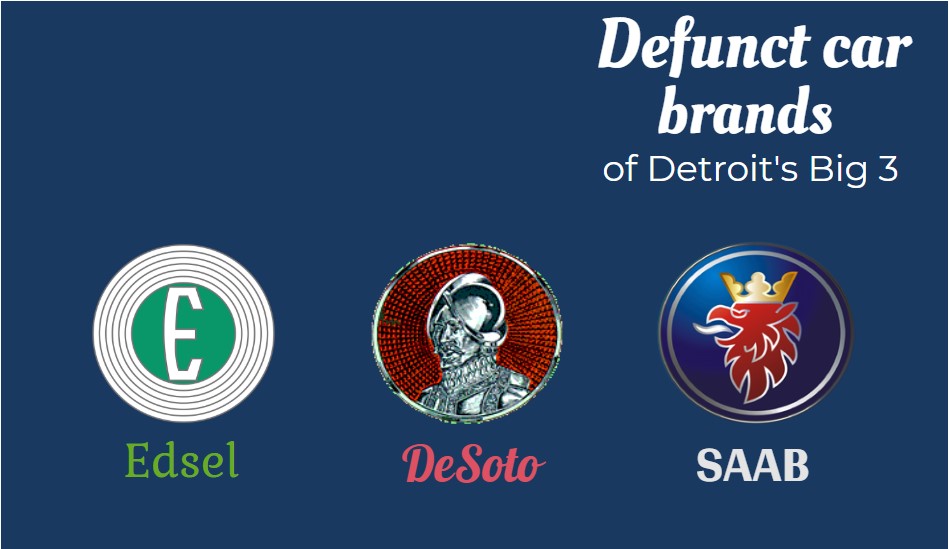When you think of American car brands, chances are that Detroit’s giants of Ford, Chrysler, and General Motors – or at least one of their popular subsidiaries – come to mind. Sure, you may not see too many Pontiacs, Plymouths, or Mercury vehicles still on the road. But virtually every driver over the age of 25 is at least familiar with these now-defunct automotive staples.
However, aside from the well-known car brands that ultimately got axed during the auto industry’s restructuring period of the 2000s, there were other marquees of the Big 3 that are no longer with us – most of which only car buffs or old-timers likely remember.

You’d be hard pressed to find any of the following defunct brands on the road today – aside from the occasional appearance at the local car cruise.
But that doesn’t mean that these long-gone brands should be forgotten.
Edsel
Since its humble beginnings in 1903, Ford has seen unparalleled success in the auto industry. For one, the company gave us the first affordable, mass-produced car in the form of the Model T, which gave rise to both the middle class and the suburban landscape.
And its F-Series line of light and heavy-duty pickups, first introduced in 1948, remains one of the best-selling vehicles of all-time.
However, that’s not to say that FoMoCo didn’t experience its share of failure, too. Arguably one of its biggest flops was the introduction of the Edsel brand in 1958, named after Henry Ford’s only son.
Mimicking General Motors’ strategy to have a car brand for every type of consumer, the Edsel was positioned to directly compete with Buick and Oldsmobile.
Despite its futuristic design – which included a Teletouch transmission and rolling dome speedometer – these options were deemed to be too ahead of the time, and the brand was subsequently discontinued after only two years.
It’s known as one of the most prolific commercial failure, though. simply because Ford invested $400 million into the product without conducting proper market research.
DeSoto
Shortly after Walter P. Chrysler formed Plymouth as the every man’s car company, the auto magnate realized that he did not have a middle-of-the-road brand that could be slotted directly under the upscale line that was named after himself.
Hence, the DeSoto division was born, one that sold nearly two million units during its 33-year run from 1928-1961.
But despite the fact that most DeSotos featured a sleek and sporty design at an affordable price, the late-1950s models known to have faulty torsion bars and leaky windshields. So, after the decision was announced to kill the brand following the 1960 model year, the last 3,000 were built using a hodgepodge of leftover Chrysler and Dodge parts – meaning that these final models weren’t really true DeSotos at all.
Saab
Saab isn’t that obscure of a brand since it was only discontinued by parent company GM in 2010, the result of Chapter 11 restructuring. But, in an era when General Motors also got rid of more recognizable brands like Oldsmobile and Saturn, this Swedish manufacturer is often forgotten as once being a part of the Big 3.
It’s not that Saab didn’t produce a popular car. However, affinity for this brand was always an acquired taste, one that was marketed toward someone who preferred peppy European-inspired rides in a boxy shape – as opposed to a torquey V8 stuffed into a rounded body.
GM took partial ownership in Saab in 1989 and, 11-years later, controlled 100% of the brand.
And after selling off its stake nine years ago to Dutch manufacturer Spyker Cars, Saab bounced around before being put on the chopping block by National Electric Vehicle, a Swedish-Chinese consortium aimed at breaking into the electric car segment, in 2016.
If you have a discontinued vehicle brand or model, and need any body and/or mechanical work, give Andy’s Auto Service a call at 412-478-9304 for a FREE estimate.